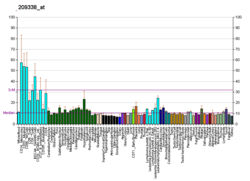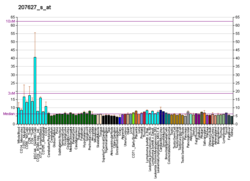Alpha-globin transcription factor CP2 is a protein that in humans is encoded by the TFCP2 gene. [5] [6]
Contents
TFCP2 is also called Late SV40 factor (LSF) and it is induced by well-known oncogene AEG-1. [7] LSF also acts as an oncogene in hepatocellular carcinoma. [8] LSF enhances angiogenesis by transcriptionally up-regulating matrix metalloproteinase-9 (MMP9). [9]
Along with its main oncogene function in hepatocellular carcinoma (HCC), it plays multifaceted role in chemoresistance, epithelial-mesenchymal transition (EMT), allergic response, inflammation and Alzheimer's disease. [8] [10] The small molecule FQI1 (factor quinolinone inhibitor 1) prevents LSF from binding with HCC DNA, which results in HCC cell death. [8] [10] [11]





